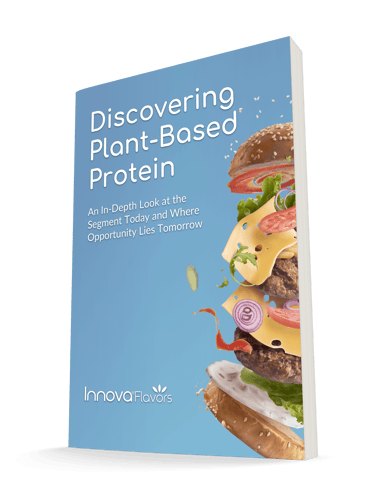Whether they’re motivated by health, ethical concerns or simple curiosity, consumers around the world are incorporating more plant-based meals, snacks, and beverages into their diets. In North America, as consumers report wanting to limit – but not eliminate – their meat intake, we’re seeing innovating product offerings such as sausages that blend humanely raised meat with fresh vegetables.
With the success and popularity of plant-based burgers on international menus, other types of plant-based items that mimic the taste or texture of meat are on the rise. Swiss customers are finding pea protein tuna on grocery shelves, while Chinese customers can choose vegan duck neck, plant-based spicy crayfish or beetroot zongzi as more healthful alternatives to traditional dishes.
However, not all plant-based items are meant to recreate the attributes of meat. For example, Thai crispy oyster mushrooms are promoted as a better-for-you alternative to meat snacks, and Brazilian smoke-flavored bean sprouts deliver on both taste and nutrition, with vegan and high-protein claims on the package. Flavorful, memorable items like these appeal to a growing population of consumers who seek out unique plant-based options as part of a flexitarian lifestyle.
 ‘Meating’ Expectations
‘Meating’ Expectations
Plant-based meat burgers are most often consumers’ first experience with the world of plant-based protein. Consumers often start with a plant-based burger to feed their curiosity and sense of adventure, in addition to wanting the health and environmental benefits that come along with it. Plant-based meat substitutes can be found on menus throughout the world, and burgers are a great “gateway” dish for curious diners.
The growth of plant-based meat is supported primarily by adults who continue to eat real meat. While most adults believe that meat is the best source of protein, Mintel reports in Plant-Based Proteins (May 2020) that many also believe plant-based foods can provide enough protein on their own. The brands that offer a “meaty” plant-based alternative are finding success with the average consumer and stand poised to earn greater market share, according to the report.
A Sea of Opportunity
The plant-based meat category is to the point of near saturation of the market, and 47% of consumers say they are looking for greater variety in plant-based proteins. Plant-based seafood is a market white space and expected to be to 2021 what plant-based burgers were to 2019. According to the Good Food Institute’s Plant-Based Market (2020 Release), seafood accounts for just $9.5 million or one percent of the more than $5 billion in total plant-based meat and seafood dollar sales.
Double Down on Dairy
Similar to how quickly consumers adopted the plant-based burger, so too have they welcomed plant-based milk, which is now purchased by 41 percent of households. Consumer acceptance of plant-based milk has laid the groundwork for growth in other plant-based dairy categories, according to GFI.
Plant-based cheese is an opportunity for growth within the non-dairy category as only 19 percent of consumers say they or someone in their household uses non-dairy cheese. By comparison, 74 percent of consumers say they or someone in their household uses plant-based milk.
Daiya and Follow Your Heart, which was recently acquired by Danone, lead the plant-based cheese category, but new players are moving in quickly with innovative products and more robust nutritional profiles, according to Mintel.
Flavor Inspiration
The American Society of Flavor Chemists defines flavor as, “the sensation caused by any substance taken into the mouth which stimulates one or both of the senses of taste and smell and/or also the pain, tactile and temperature receptors in the mouth.”
In the plant-based foods category, flavor is used to deliver a specific desirable taste profile, disguise unpleasant notes such as bitterness or soy, and make finished products more palatable.
Get inspired by this on-trend gyro concept to create innovative offerings using Innova Flavors products.
Deliver a gyro flavor experience in a blended animal and plant (pea, mushroom, lamb and beef), and plant-based (pea and mushroom) protein substrate topped with our refreshing vegan tzatziki sauce. 
At Innova Flavors, we have been working in the plant-based category since 2003. We are meat and savory flavor specialists, delivering authentic vegan flavors and have an experienced technical team who can develop customized solutions for your unique substrate and processing parameters.
Please contact your Innova Flavors representative to learn how this trend can be customized to your product portfolio.


